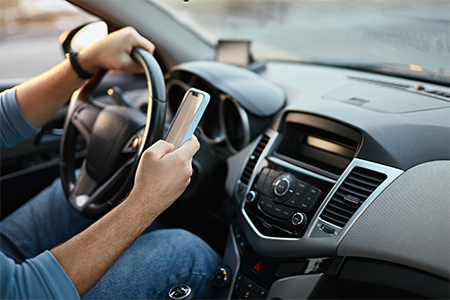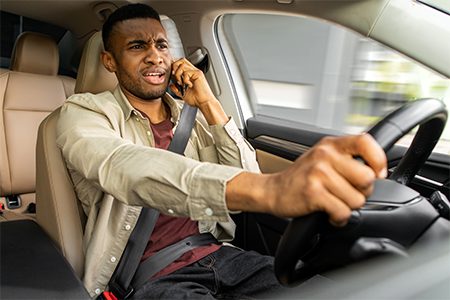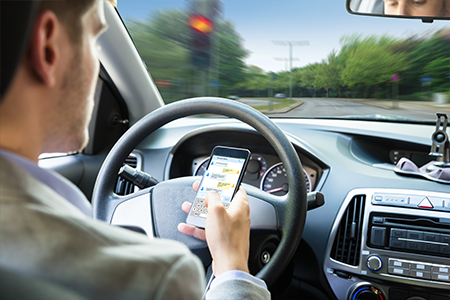Using Mobile Phones When Driving

Driving a car demands your complete attention. Split-second distractions can have devastating consequences. That’s why using a mobile phone behind the wheel is a major road safety risk in the UK.
Here’s a comprehensive breakdown of the current mobile phone driving laws to keep you safe and legal on the road.
What are the Mobile Phone Driving Laws?
The UK has a strict zero-tolerance policy when it comes to using a handheld mobile phone while driving. This law, introduced in March 2022, applies to all motorists, including car drivers, motorcyclists, and even cyclists.
It covers any use of a handheld device that can send or receive data, regardless of whether it’s connected to the internet or not.
Is it illegal to touch your mobile phone when driving?
Simply put, yes. The law is clear and unforgiving: you cannot hold your phone in your hand for any reason while the vehicle is in motion.
This includes common actions like texting, making calls, taking photos or videos to capture interesting sights, playing games to pass the time, or scrolling through social media feeds for updates.
The hands-free mobile phone laws apply in all driving situations, not just when you’re speeding down the motorway. Here are some common scenarios where you might be tempted to reach for your phone, but remember, it’s still illegal:
Stuck at traffic lights:
Waiting at a red light can be a time-killer, but don’t use it as an excuse to check your phone.
Crawling in traffic jams:
Traffic jams are frustrating, but using your phone won’t make them move any faster.
Supervising a learner driver:
Your role as a supervisor is crucial. Focus on their driving and avoid distractions.
In a car with a start-stop engine:
Even if your engine cuts out when you stop briefly, the law still applies. Don’t be caught off guard.
Using an offline or flight mode device:
The law isn’t about internet access, it’s about preventing distractions. Don’t hold and use any device that can take your attention away from driving.
Can you use a mobile phone hands-free when driving?
While using a hands-free kit might seem like a safer alternative, the law isn’t just about holding the phone. The core principle is to avoid distracted driving.

If the police observe you using your phone in a way that impairs your focus on the road, you can still be penalised regardless of whether you’re holding the device. This could include tasks like fumbling with buttons on the headset to change music, taking a call, or engaging in a conversation that diverts your attention from the driving task.
Alternatives for hands-free use: Hands-free options like mounted phone holders can be helpful for navigation purposes, but only if they are used safely. Ensure your route is programmed before you begin your journey, and minimise any interaction with the device while driving.
When can you use a mobile phone in your vehicle?
The only scenario where using your phone is considered safe is when your vehicle is completely stopped and not moving momentarily. This means being pulled over on the hard shoulder or parked safely off the road.
Even in these situations, it’s important to consider the potential consequences. If you need to move off suddenly due to an unforeseen situation, reaching for your phone could cause a delay and increase the risk of an accident.
Exceptions for emergencies: It’s important to remember that this law doesn’t apply in all situations. You are always permitted to use your phone to call the emergency services (999 or 112) if you are involved in an accident or witness one on the road.
How many points for using a mobile phone when driving?
Breaking the mobile phone driving law can result in a significant financial penalty. You could be slapped with a £200 fine, which can put a strain on your wallet. Furthermore, the offence carries a penalty of six points added to your driving licence.
This is particularly concerning for new drivers who have passed their test in the last two years. Accumulating six points within this period can lead to disqualification from driving, forcing you to retake your driving test.
Beyond the initial penalty, the consequences of using a phone while driving can be even more severe. If you’re caught and your driving is deemed to be noticeably impaired by using a handheld device, you could face additional penalties. This could include three further penalty points on your licence, bringing the total to nine points for this offence.
Remember, these are just the potential penalties. The real cost of using your phone while driving could be far greater. It could lead to an accident that injures yourself, your passengers, or others on the road.

Could I lose my license for using a phone?
In extreme cases, yes. If you’re caught using your phone while driving and it’s deemed to be causing dangerously inattentive driving, you could face prosecution in court. This could result in a much harsher penalty, including a driving ban that prevents you from operating a vehicle for a set period.
The court can also impose a more substantial fine, reaching up to £1,000 for car drivers and a staggering £2,500 for those driving lorries or buses. In the most severe cases, you could even end up with a criminal record for dangerous driving behaviour.
Public awareness campaigns
Many government and road safety organisations run campaigns to raise awareness about the dangers of distracted driving. These campaigns often highlight the real-life consequences of using a mobile phone while driving. You can find more information and resources online to learn more about the dangers and stay safe on the road.
By understanding the mobile phone driving laws and their potential consequences, you can make informed choices that keep yourself and others safe on the roads. Remember, arriving at your destination a few minutes later is far better than putting yourself and others at risk by using your phone behind the wheel.
Make a conscious effort to put your phone away and focus solely on driving. By doing so, you’ll be contributing to a safer driving environment for everyone.
Blog Comments
To view, comment or reply to comments you must be logged into facebook



